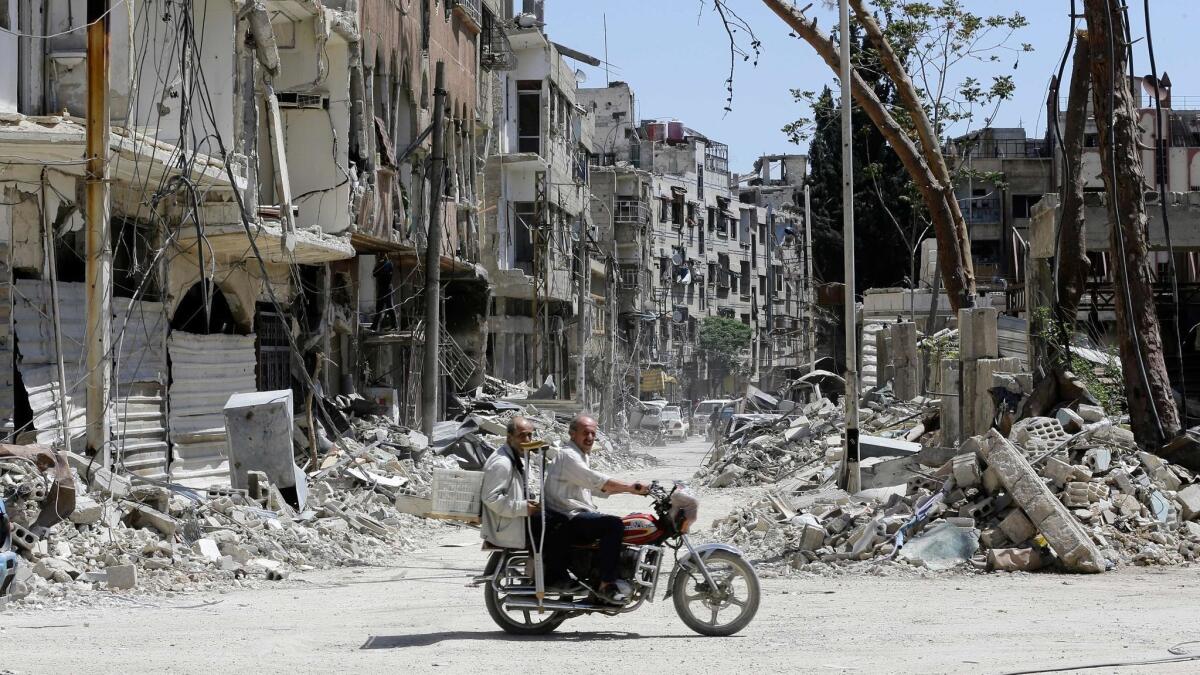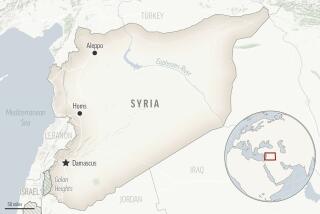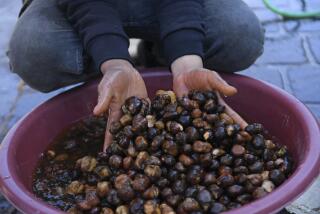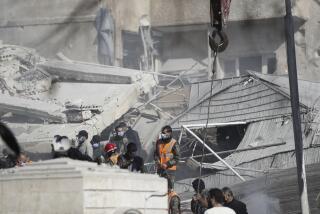Syrian state media says international chemical weapons inspectors have reached Duma

A team of international chemical weapons specialists entered the Syrian city of Duma on Tuesday, state media said, in a bid to inspect the former rebel bastion hit this month with a suspected poison gas attack by the government.
The inspectors with the Organization for the Prohibition of Chemical Weapons, whose arrival in Duma was not immediately confirmed by U.S. officials, are tasked with collecting samples from the site and speaking to witnesses. The organization’s mandate with the United Nations means it can only determine if a chemical attack occurred, not assign blame.
The April 7 attack, which activists say killed more than 40 people, ratcheted up tension between Western nations and Damascus, spurring the U.S., Britain and France to launch airstrikes on what were said to be the manufacturing sites of Syria’s chemical arsenal. Officials in Damascus and Russia, a key ally of Syrian President Bashar Assad, deny responsibility for the Duma attack and have accused others of staging it.
OPCW Director-General Ahmet Uzumcu said Monday that nine inspectors had assembled in Beirut, the Lebanese capital, before making their way to Damascus, Syria’s capital.
But, he said, the fact-finding mission could not deploy to Duma, less than eight miles northeast of the capital, until what Syrian and Russian authorities called “pending security issues” could be worked out.
Russian and Syrian troops as well as journalists had already made their way into the area in the days after the government’s takeover of Duma on Saturday.
The delay kicked up a flurry of accusations from Western powers, including Kenneth Ward, the U.S. ambassador to the OPCW, who accused Russia of interfering with the Hague-based organization’s attempt to conduct an effective investigation.
State Department spokeswoman Heather Nauert said Tuesday that U.S. officials could not independently confirm that the OPCW inspectors had arrived at the attack site. A delay would “further degrade” evidence, she said.
“The Syrians and the Russians, their goal is to cover up,” Nauert said.
The French Foreign Ministry said in a statement Tuesday that it was “very likely that proof and essential elements are disappearing from this site.”
But Russian Foreign Ministry spokeswoman Maria Zakharova on Tuesday called on “Western countries that staged the illegitimate strike on Syria to stop manipulating public opinion and meddling with the work of international organizations,” according to the Russian state news agency Tass.
“I don’t see why the French Foreign Ministry is speaking for the OPCW and its inspectors,” she said.
Russian officials earlier claimed that the Duma attack in the Ghouta region had been staged by Britain, a charge the nation’s OPCW envoy Peter Wilson denied as ludicrous.
Russia’s military said it had found a rebel chemical laboratory and warehouse in Duma, according to Tass.
Opposition-aligned medics and rescue workers contend than Syrian loyalist troops deployed barrel bombs filled with chemical weapons on April 7 in Duma, the largest city in the onetime rebel-held enclave of east Ghouta.
The munitions, normally filled with explosives and metal detritus and dropped from helicopters, struck buildings where residents had taken shelter, killing 43 people and leaving some 500 others with symptoms including breathing difficulties, skin discoloration, eye irritation and foaming at the mouth.
After the attack, opposition factions accepted an evacuation deal out of Duma that gave the government control of east Ghouta after a bloody, six-year stalemate.
Western nations insisted after what was said to be analysis of open-source evidence, including videos uploaded by opposition activists, that chemical weapons had been deployed and that Syrian government troops were to blame.
Last week, they launched a barrage of missiles on a number of sites, including research centers and primary airfields, around Damascus and the central Syrian province of Homs.
The strikes, though described by U.S. Defense Secretary James N. Mattis as a “one-off,” have nevertheless put nerves at a breaking point in the area.
Syrian air defenses were activated early Wednesday in what turned out to be a false alarm, according to the official Syrian Arab News Agency, or SANA. An unnamed military official told SANA the country “was not targeted by any foreign aggression.”
Bulos is a special correspondent.
Twitter: @nabihbulos
Times staff writer Tracy Wilkinson in Washington contributed to this report.
More to Read
Start your day right
Sign up for Essential California for news, features and recommendations from the L.A. Times and beyond in your inbox six days a week.
You may occasionally receive promotional content from the Los Angeles Times.







